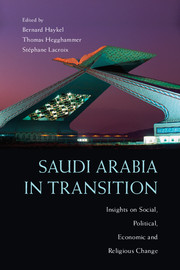Book contents
9 - Understanding Stability and Dissent in the Kingdom
The Double-Edged Role of the jama‘at in Saudi Politics
Published online by Cambridge University Press: 05 January 2015
Summary
It is a common idea in Western scholarship on Saudi Arabia that, except for clandestine jihad-oriented groups, the kingdom is devoid of influential nonstate institutions and organizations, whose very existence is officially against Saudi law. As a consequence, only two kinds of groups have generally been considered able to counterbalance, to some extent, the power of the Saudi state. First are the tribes. Yet, although it is true that the tribes have retained some of their cohesion, especially in the countryside, they are a much less significant reality in the cities where, among other things, the existence and diversity of competing affiliations have weakened them. Second is what some authors have referred to as the technocratic “new middle class,” understood to constitute a distinctive social group harboring an inherently modernist agenda. However, I am not convinced that this group is necessarily modernist, nor do I find any indication that it has any cohesion, and so considering it as a counter-power to the state seems to me to be wishful thinking.
In contrast to those two kinds of groups, the religious forces are usually described as having been “bureaucratized” and integrated to the state within what is largely referred to as the “religious establishment.” As a consequence, they have generally been portrayed as a mere appendix of the regime, and never as a buffer between state and society. An exception is found in the literature on Islamism, which offers a more oppositional view of Saudi Islam. Yet, it focuses on individualities (“charismatic preachers” such as Juhayman al-‘Utaybi, “dissident ulama” such as Safar al-Hawali) – as if contention was merely driven by individual moves – rather than on the structures and resources necessary for collective action. As a consequence, very little has been said of the role of religious networks in a society where Islam is agreed to play a central role in structuring social relations.
- Type
- Chapter
- Information
- Saudi Arabia in TransitionInsights on Social, Political, Economic and Religious Change, pp. 167 - 180Publisher: Cambridge University PressPrint publication year: 2015



